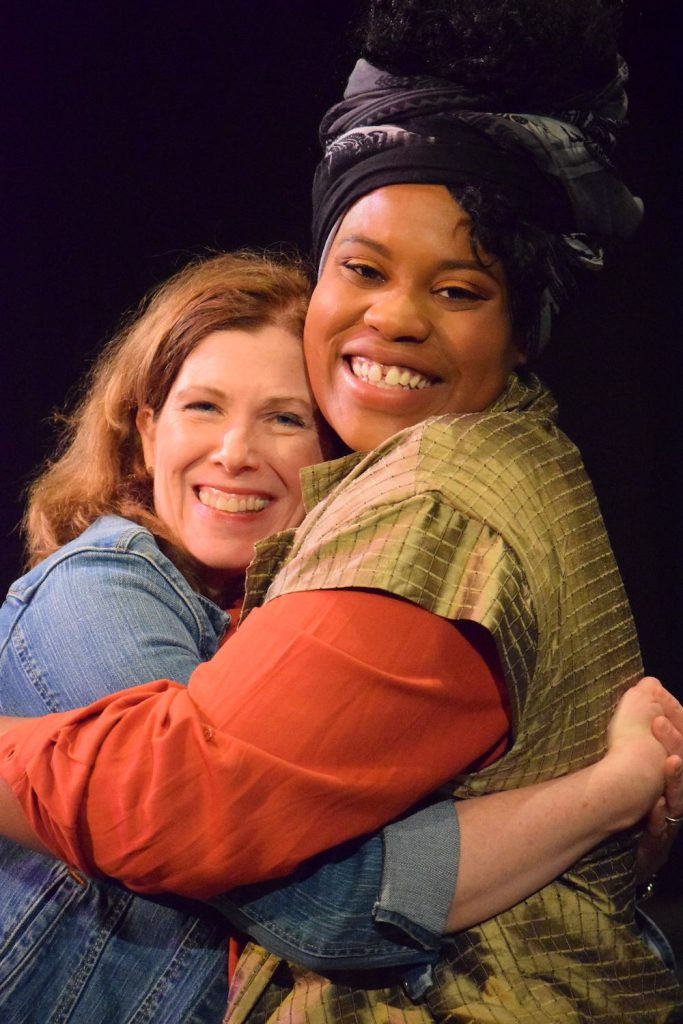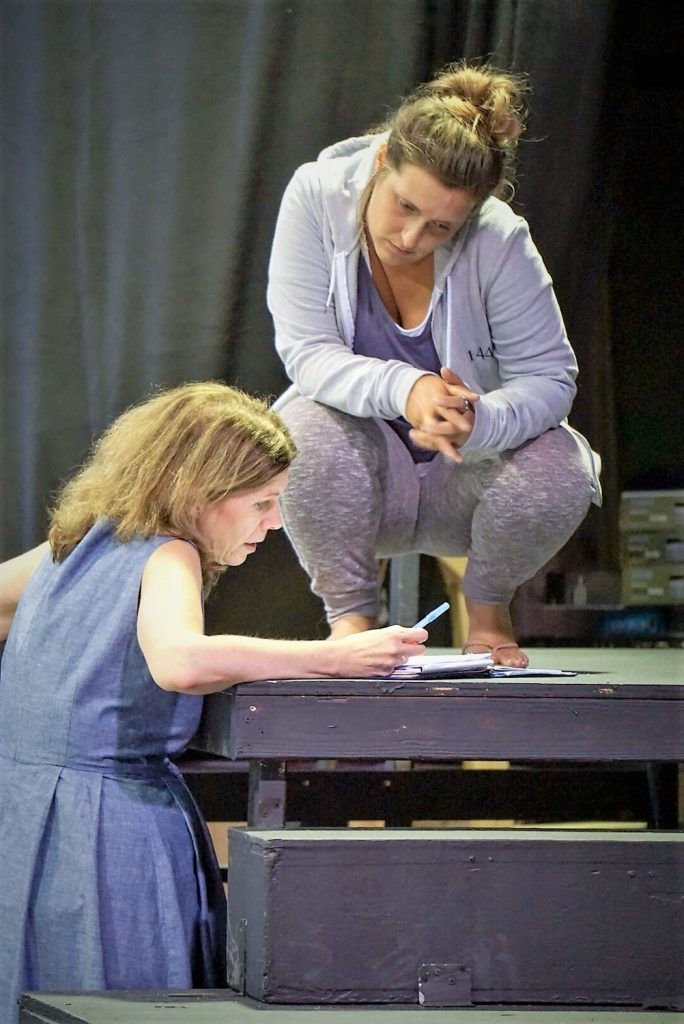Act II: Returning to the Classroom
- Louise Casini Hollis
- Aug 3, 2020
- 7 min read
Updated: Dec 5, 2020
Words by Louise Casini Hollis. Photos courtesy of Sally Shedd.

As colleges across the nation prepare to go back to school, some subjects will have to adjust more than others, including the performing arts. In the not too distant past, the performing arts evolved to utilize radio and television, but live entertainment – performers sharing the stage and performance space with an audience – has continued to be a special communal experience. Human beings need the connection of shared experiences, and the presence of community. Dr. Sally Shedd, Professor of Theatre at Virginia Wesleyan University, is no exception. Sally is looking forward to the Fall semester and returning to teaching her classes in-person, in the moment. “As a theatre person, of course I believe in the synchronous experience” observes Sally. “People who are drawn to theatre tend to love interaction. That’s not a big stretch that I would value that, right?” she laughs.

Virginia Wesleyan’s community has been gathering to share stories for over 50 years. The first theatre production at Virginia Wesleyan, Ionesco’s The Bald Soprano, was presented by the Virginia Wesleyan Drama Society, a student organization, in the dining hall in May of 1969. It was directed by Dolly West, a French instructor. The theatre department was founded a few years later. Professor Emeritus, Rick Hite directed the department’s first production Goldoni’s Servant of Two Masters, in 1969. The department has grown substantially over the years. In 2005 a second full time faculty member, Dr. Travis Malone, was added and in the Spring of 2019 it took a giant leap forward as their main stage productions moved to the University’s new performance space, the Susan S. Goode Fine and Performing Arts Center. Productions at VWU typically have around 50 students involved volunteering in some capacity, and students may earn community service hours for their participation. “We are very proud to have all kinds of students on our campus involved in theatre productions and that’s really the beauty of a liberal arts college is that you are reaching out – that a bio major has these experiences too. We welcome them. And that’s a real strength – we like that,” adds Sally.
Originally from Ozark, Arkansas, Sally grew up performing whenever her Mother, an elementary public school music teacher, needed an extra hand. “I played Mickey Mouse in a mouse suit, pageants at church – all of that,” she reminisces fondly. “I think that eventually I was drawn to theatre in part because it was mine. And I just really love working with other people to create something.” Sally went on to earn B.A.s in Music Performance and Speech & Theatre from Arkansas Tech University; an M.A. in Drama from the University of Arkansas; and finally to the University of Kansas for her PhD in Theatre. “I am forever thankful to the University of Kansas for everything they did for me to nurture me and mentor me so I’m very active with them still,” Sally shared. “They will always be in my heart.”

Sally and Khari Johnson who played Prospera in The Tempest ,Fall 2018.
When she began applying for jobs, she followed the advice of her mentor who told her, “There are some things worth more than money.” So when Sally interviewed at Wesleyan, she was sold because, “it just felt like family. It felt like home. And I’ve never looked back.” Now 21 years later, she is looking forward to the start of a new, albeit different, school year.
Sally was teaching 3 classes this Spring when VWU made the difficult decision to go remote for the rest of the semester over Spring Break. She found that synchronous learning worked best for her classes. “Remember, this isn’t the same as teaching an on-line class,” observes Sally. “This is suddenly – you’ve designed a face-to-face course, that you really didn’t think of as face-to-face – it’s just a course – then about mid-way through you’re having to deliver the rest of the content and fulfill the requirements remotely. Which is not the same thing as building an on-line course.” In her script analysis class, Page to Stage, Sally met with her students via Google meet once a week and then allowed them to use the second class period time for individual work. “I purposefully gave that class more discretion with how they spent their time” explained Sally. “Many of the students in that class went home to full time jobs, to deliver child care for siblings – remember the schools had been shut down – and I wanted them to have the ability to do the work when it best suited their schedules. Also, there’s an equity issue. Let’s say a household is sharing one computer: their siblings need it in the daytime, or their parents working from home. So I really wanted to give that class a lot of leeway for how their requirements got filled,” she added.
For her Advanced Acting class, she went synchronous twice a week. Sally adapted the class by having students upload their performances and allowing them to substitute some type of recorded solo performance for a two-person scene if they had not already performed a scene before mid-term. She found that for some of her students, recording their performances, “added a quality of rehearsal, and I think some of them greatly benefitted from seeing themselves perform,” so she will have a component of students recording themselves in the future.
Sally also team-taught a Batten Honors class, The Artist and Society. Her portion of the class was to introduce students to a hands-on experience of performing. Sally said she had to rework her lesson slightly, “but you do what you’ve got to do, the work goes on. And I will say that class was lovely,” continued Sally. “They completely rose to the occasion. We did this weird little warm-up exercise that we did together every day. Twenty eight people hootin’ and hollering with delays. We added ‘jazz hands’ at the end just so we would all visually know when we got to the end because there’s such a lag time. But it was raucous, and joyous. I will say it was challenging delivering it remotely. But, you know, theatre artists are entrepreneurial. That is what we do. We always do that, even when there’s not a pandemic, and we have to do it even more so when we’re offered these challenges to, ‘How is the work going to go on?’ Well, it’s going to go on. And it may be better. It will be different. Maybe better. Really it gets us to embrace the parts of us that are creative problem solvers,” observed Sally. The class, “finished strong,” she concluded. “I was very proud of them and I hope they were proud of me cause we did that together.”

Sally and Pierrette Swan during Tempest rehearsals.
As successful as her on-line classes were this Spring, Sally is looking forward to getting back to the classroom this fall. “I love to teach. I love my students – I do,” she shared. “It sounds hokey, but I really, really do.” Virginia Wesleyan’s faculty was asked for feedback regarding their preferred mode of teaching: on-line or in-person. Accommodations will be made for faculty and students who wish to remain remote. Sally intends to teach in-person. “I’m all for the mask, but I’m acknowledging that it’s going to be different. We’re also going to have access to some face shields, so if they stand far enough away, the actors could take off the mask and we could see the expression on their faces with the face shield,” she adds.
Virginia Wesleyan will also adjust their schedule by starting on Monday, August 24th and will be forgoing Fall break. Students will then move out at Thanksgiving Break and have their last week and a half of classes and final exams delivered online. They also have contingency plans: “If any faulty member or student gets sick, we have to be prepared to deliver the rest of the content for the semester to that student if they are well enough to continue. If they just need to be distanced through technology, and they’re not too ill to continue the course, I want to continue providing it for them.” The same remote contingency plan is in place for faculty if they get sick and must deliver the rest of their courses online.
Social distancing has also been carefully calculated by the University and class sizes have been capped to make sure students may safely social distance. Cleaning protocols have also been put in place. “That’s our current plan for now but as you know, if the pandemic’s taught us nothing, it’s that everything is flexible,” said Sally.
Although there will be accommodations, Sally and Dr. Travis Malone have assured their students, “We’re doing productions at Wesleyan next year!”
“They may be remote. They may be outside. But nothing will stop us from doing it,” assured Sally. Travis will be directing the Fall show. They were not too far into planning this year’s season when the pandemic hit, Sally shared, so, “as a department we’ve gotten to think this through as the pandemic has sort of unfolded. Travis has a background in film and video production, so I believe the main stage show is probably going to be a filmed performance of perhaps a devised work that the students are creating.” Having a filmed final performance will also free up a time slot in the Goode Fine and Performing Arts Center allowing students to hold their One Act directing projects in that space if conditions are favorable for gathering there. “The Goode seats 50 with social distancing and the One Act casts are traditionally very small,” adds Sally. “So they could be offered inside, or it could be done outside, socially distanced.”

Dr. Sally Shedd, Dr. Travis Malone, and student Abby Horgan in Legally Blonde at the Susan S. Goode Fine and Performing Arts Center.
Sally is scheduled to direct a musical in the Goode in April of 2021 and says that she will “move forward with the idea that we’re going to be able to stage a musical. If it should become evident that we can’t, I will have a backup plan. I’ll probably have 2 or 3 back up plans,” she laughs, “because that’s how I roll. But we will be doing something.”
Whatever form the Spring semester takes, Sally is confident she and her students will conquer it together. “I’m really proud that our department is very supportive and lovely to each other,” she beams. Working at a small college like Virginia Wesleyan allows her to foster close bonds with her students. “When you are at a small enough place you notice everything – even when they get a haircut. You notice when their diction gets better on a piece. You notice when, ‘Oh my God this work on this monologue is the most honest straightforward work I’ve ever seen you do! I feel like you’re really opening up! This is amazing!’ You know that because you have seen their previous work, and there’s just no substitute for that. I really love being on that journey with them. There’s something that is such a gift, to see them – to witness that, and maybe share that with them,” she concludes. Thankfully, Sally and the rest of the Virginia Wesleyan community will soon resume their journey together, strengthening their bonds and sharing their stories.
You can check out the VW Theatre Department here.

Comments